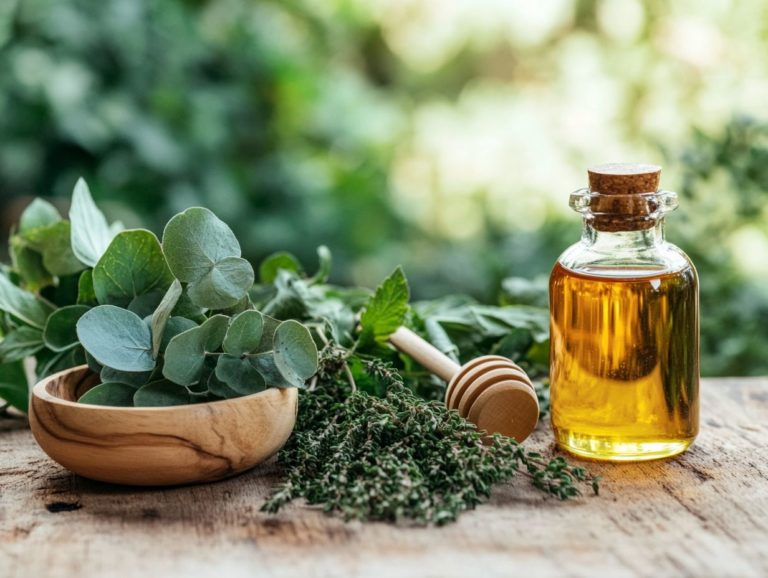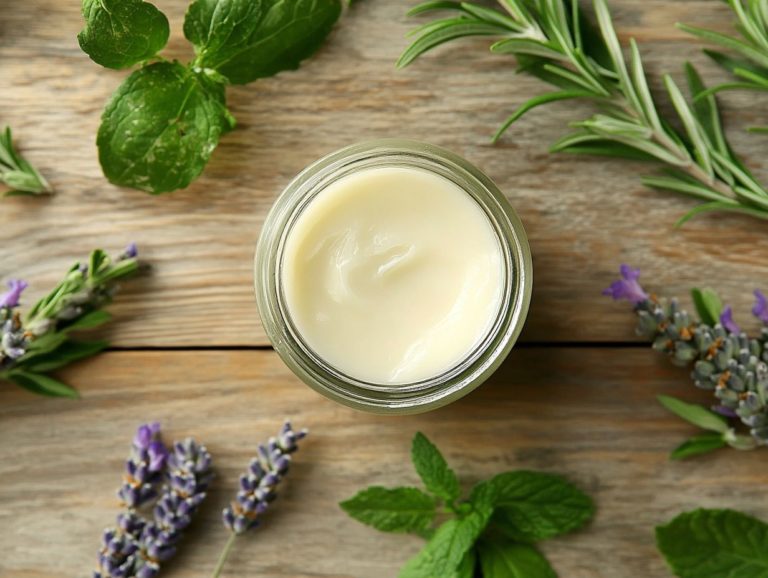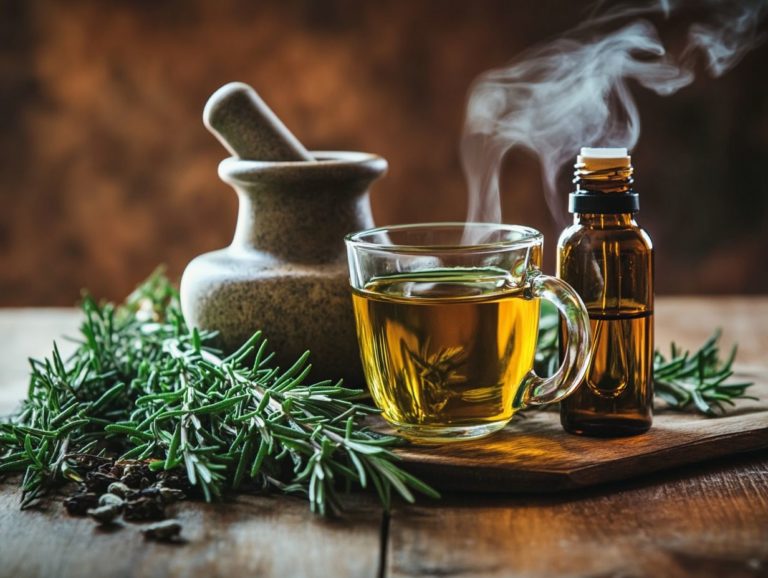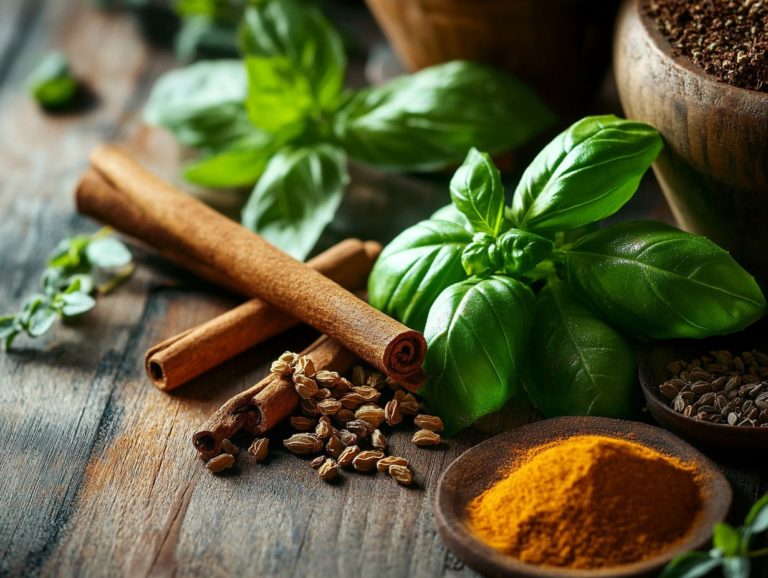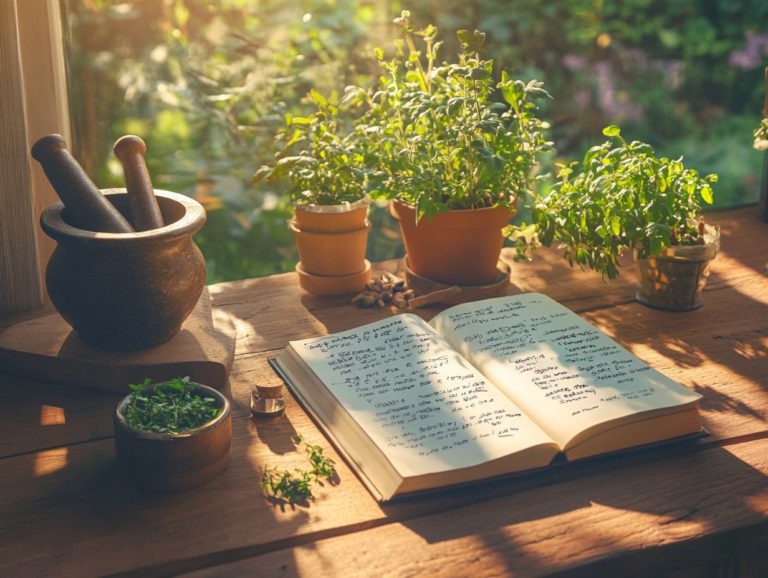Herbal Remedies for Anxiety: What Works?
Anxiety affects millions of individuals and presents itself in various forms and intensities. Understanding the causes and types of anxiety disorders is key to managing them effectively.
While traditional therapies hold significant value, many are exploring herbal remedies as a natural alternative. This article delves into popular herbs and supplements that claim to alleviate anxiety, all backed by scientific research.
You will also find best practices for their use, including important safety considerations. These remedies can complement other treatment options.
Jump in and discover natural ways to tackle anxiety!
Contents
- Key Takeaways:
- Understanding Anxiety and Its Causes
- Common Herbal Remedies for Anxiety
- Evidence for Effectiveness
- Best Practices for Using Herbal Remedies
- Combining Herbal Remedies with Other Treatments
- Frequently Asked Questions
- What effective herbal remedies exist for anxiety?
- Can herbal remedies truly help manage anxiety?
- What are the potential side effects of using herbal remedies for anxiety?
- How should I take herbal remedies for anxiety?
- Do herbal remedies interact with other medications?
- Can I replace prescribed medication with herbal remedies for anxiety?
Key Takeaways:
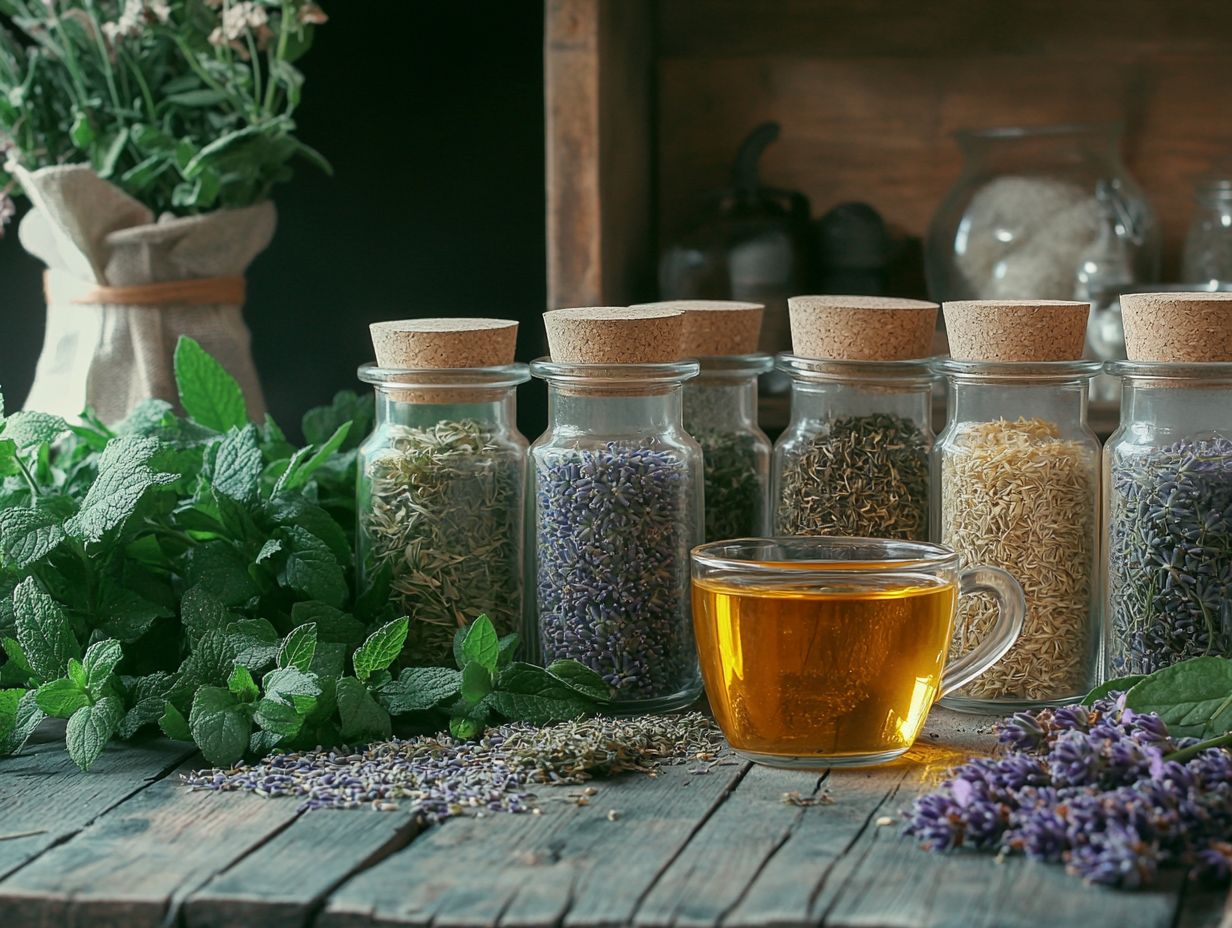
- Herbal remedies can effectively manage anxiety, but it’s crucial to understand your triggers before choosing one.
- Some studies support the effectiveness of certain herbs, but always consult a healthcare professional first.
- Discuss with your healthcare provider before mixing herbal remedies with other treatments.
Understanding Anxiety and Its Causes
Knowing what causes anxiety is crucial for improving your mental health and emotional well-being. Anxiety disorders can profoundly impact your interactions and experiences in personal and social settings.
These disorders often stem from a blend of family history, surroundings, and personal experiences, resulting in symptoms like excessive worry, panic attacks, and an intensified stress response.
Recognizing how these elements interact allows you to develop effective ways to handle stress and anxiety, making lifestyle adjustments that improve your quality of life.
Types of Anxiety Disorders
There are several types of anxiety disorders you might encounter, including generalized anxiety disorder (GAD), panic disorder, and social anxiety disorder. Each has its unique symptoms and emotional challenges.
For instance, GAD often manifests as an overwhelming sense of worry about daily life, making it difficult to concentrate or relax. Conversely, panic disorder can strike with sudden, intense fear and physical symptoms like heart palpitations and shortness of breath, often appearing without warning. Social anxiety disorder involves an intense fear of social situations, leading to avoidance of gatherings due to worries about judgment.
Recognizing these symptoms is vital as it paves the way to seeking appropriate interventions, such as therapy or medication specifically tailored to address each disorder.
Potential Triggers and Contributing Factors
Potential triggers of anxiety can vary significantly, encompassing environmental stressors, substance use such as alcohol and nicotine, and underlying psychological patterns that influence emotional well-being.
Understanding these triggers is essential, as they can profoundly affect your daily life and overall mental health. For example, external factors like a demanding work environment or a chaotic home life can heighten feelings of tension. Likewise, reliance on substances may worsen anxiety levels, creating a challenging cycle that feels nearly impossible to break.
By recognizing these contributing elements, you can develop effective strategies for managing anxiety. Pinpointing specific sources of stress enables you to implement coping mechanisms tailored to your unique experiences, fostering resilience and enhancing emotional stability.
Common Herbal Remedies for Anxiety
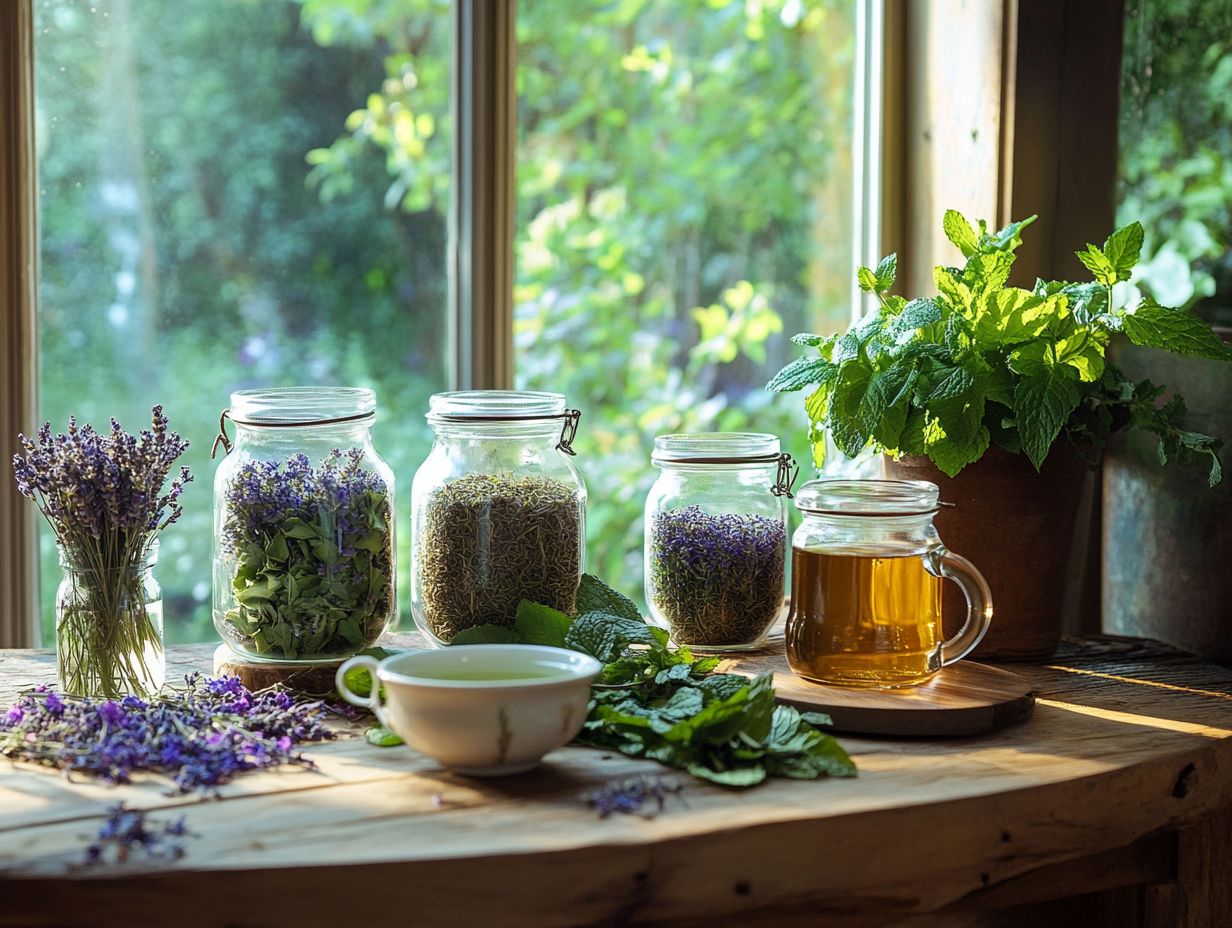
Herbal remedies for anxiety are gaining popularity. They offer natural alternatives to traditional treatments and can help ease anxiety symptoms while improving emotional well-being.
Herbs like chamomile, lavender, and kava are known for their calming properties. Research supports their use for reducing anxiety.
Additionally, passionflower and lemon balm stand out for their potential to reduce anxiety and enhance overall quality of life.
CBD products have become a popular natural remedy for anxiety. They add a valuable option to holistic approaches for relief.
Overview of Popular Herbs and Supplements
Popular herbs and supplements like chamomile, lavender, kava, passionflower, and lemon balm are effective herbal remedies for anxiety, each bringing unique calming effects.
For centuries, these natural solutions have been trusted across various cultures, offering both psychological and physiological relief from anxiety symptoms.
Take chamomile, for instance. It s a popular choice for soothing tea, known for promoting sleep and easing nervous tension.
Lavender s distinct aroma helps you relax, while kava is celebrated in Pacific Island cultures for its calming effects. Passionflower is recognized for its ability to tackle insomnia, and lemon balm is excellent for easing restlessness and agitation.
By embracing these herbs, you might discover a holistic approach to managing anxiety, allowing you to explore their benefits without the unwanted side effects often linked to pharmaceuticals.
Evidence for Effectiveness
The effectiveness of herbal remedies in treating anxiety disorders is well-documented, supported by numerous clinical trials that reveal their therapeutic benefits.
Studies indicate that ingredients such as chamomile and kava can significantly diminish anxiety symptoms, underscoring their importance in effective stress management strategies.
Research and Studies on Herbal Remedies
Research has increasingly illuminated the therapeutic effects of herbal remedies, showing promising results for anxiety relief through various clinical trials.
For instance, a noteworthy study conducted by researchers at the University of Queensland employed a randomized, double-blind methodology to assess the impact of valerian root and passionflower on anxiety symptoms. Participants experienced a significant reduction in anxiety levels after six weeks of treatment compared to those receiving a placebo.
Furthermore, a meta-analysis published in the Journal of Clinical Psychiatry underscored the efficacy of ashwagandha, showcasing its ability to lower cortisol levels, a hormone that increases in response to stress, and enhance overall stress resilience.
Such findings highlight the potential role of these herbal treatments in clinical settings and inspire practitioners to explore alternative approaches for managing anxiety.
Best Practices for Using Herbal Remedies
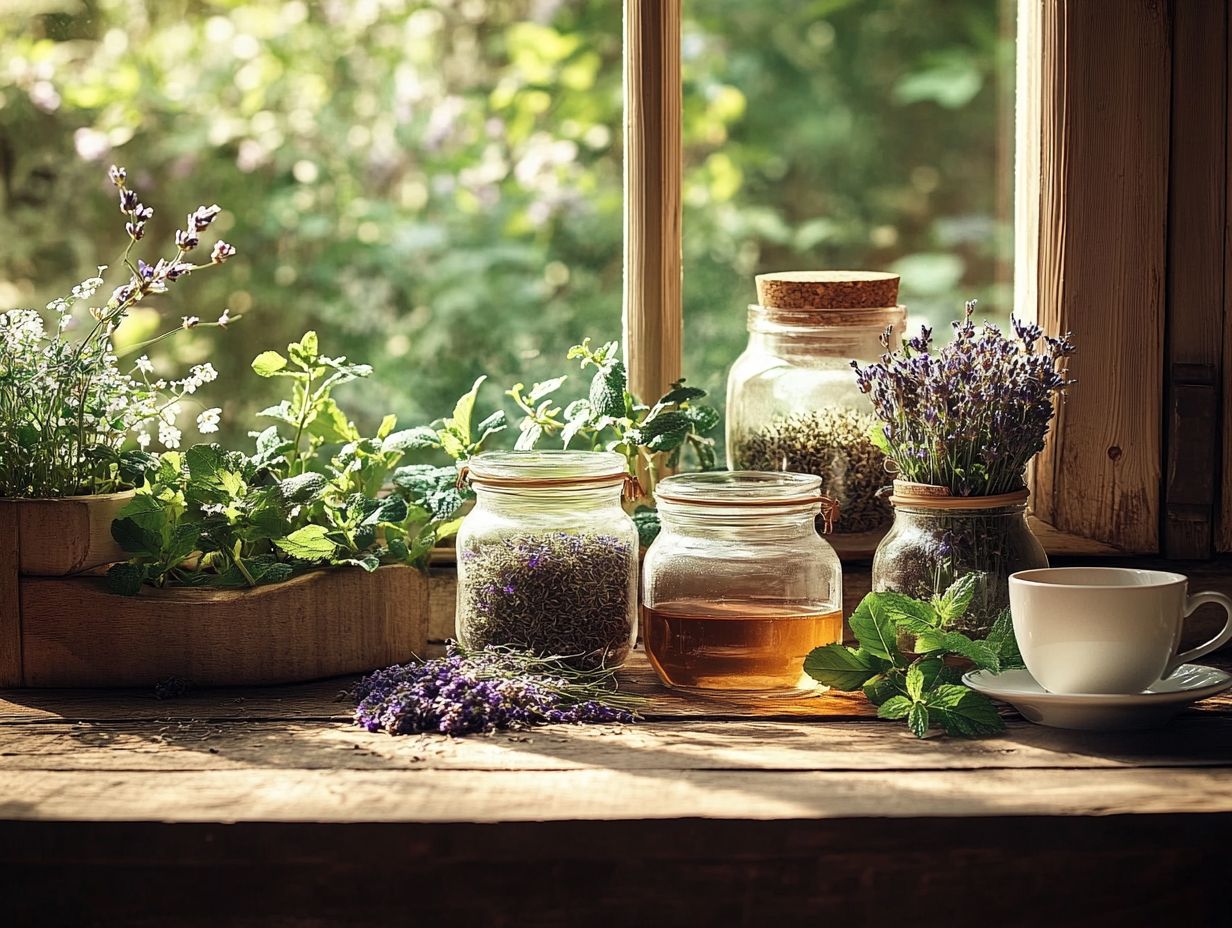
Implementing best practices for utilizing herbal remedies is essential for ensuring both safety and effectiveness in treating anxiety. This includes adhering to guidelines on dosage and being mindful of potential interactions with other medications.
By doing so, you can maximize the benefits of these natural alternatives while minimizing any risks.
Dosage, Interactions, and Safety Considerations
When considering herbal supplements for anxiety, it’s essential to understand dosage, potential interactions, and safety factors. This knowledge helps you enjoy the benefits while minimizing risks.
Many people have turned to herbs like valerian root, passionflower, and chamomile as natural alternatives to traditional medications. Valerian root is typically recommended in dosages of 300 to 600 mg, ideally taken about 30 minutes before bedtime. Mixing this supplement with other sedatives can amplify drowsiness, so be cautious.
Passionflower can also be effective at doses between 250 to 500 mg, but it may interact with blood thinners medications that decrease blood clotting thus increasing the risk of bleeding. Always consult a healthcare professional to discuss these interactions and ensure a safe experience with herbal remedies for anxiety management.
Combining Herbal Remedies with Other Treatments
Combining herbal remedies with other treatments can enhance your anxiety treatment outcomes. It’s vital to weigh both the benefits and risks, as this approach requires careful consideration tailored to your unique health needs.
Potential Benefits and Risks
Understanding the potential benefits and risks of herbal remedies in anxiety treatment is crucial for exploring alternative solutions for mental health.
By examining the synergies between these natural therapies and conventional approaches, you can discover a holistic strategy that nurtures your emotional well-being. Herbal remedies like chamomile and valerian root are often praised for their calming effects, potentially offering relief when used alongside prescribed medications.
However, stay vigilant about adverse interactions; some herbs can enhance or diminish the effects of your medications. Open conversations with your healthcare provider will help you assess the pros and cons of this integrative approach, ensuring a thoughtful balance prioritizing safety and efficacy in your anxiety management plan.
Frequently Asked Questions
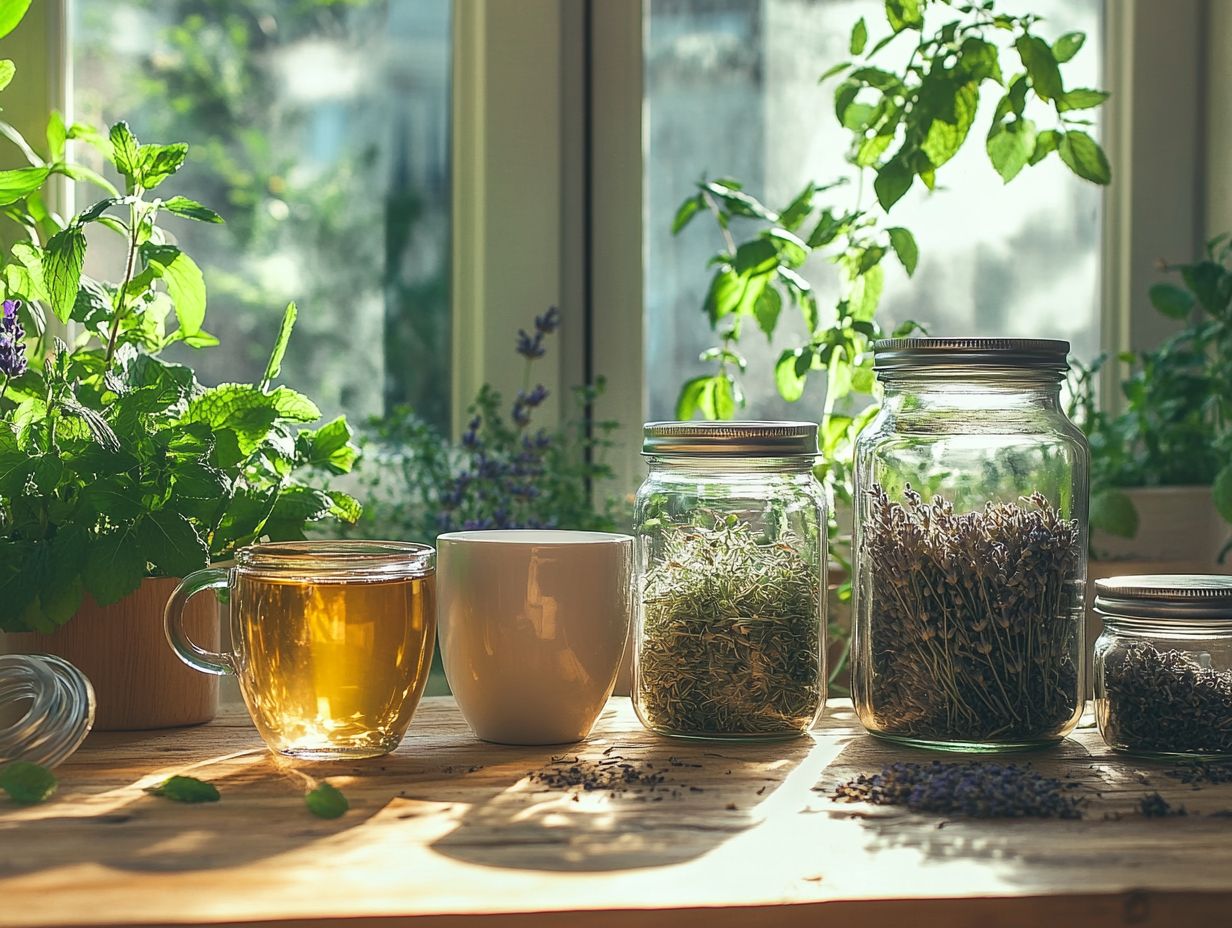
What effective herbal remedies exist for anxiety?
Effective herbal remedies for anxiety include passionflower, valerian root, ashwagandha, and chamomile.
Can herbal remedies truly help manage anxiety?
Yes, herbal remedies have been used for centuries to treat anxiety, providing calming and relaxing effects on the body.
What are the potential side effects of using herbal remedies for anxiety?
While generally safe, some herbal remedies may cause mild side effects like drowsiness, nausea, or digestive discomfort. Always consult a healthcare professional before starting any new herbal remedy.
How should I take herbal remedies for anxiety?
Herbal remedies can be taken as teas, tinctures, capsules, or oils. It’s crucial to follow the recommended dosage on the product label or as advised by a healthcare professional.
Do herbal remedies interact with other medications?
Yes, some herbal remedies can interact with certain medications. Always inform your healthcare provider about any herbal remedies you’re taking to avoid potential interactions.
Can I replace prescribed medication with herbal remedies for anxiety?
It’s not recommended to replace prescribed medication with herbal remedies without consulting a healthcare professional. While some herbal remedies may complement traditional treatments, they should not be used as a replacement without medical guidance.

